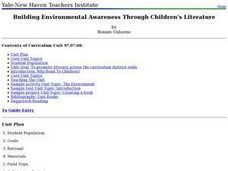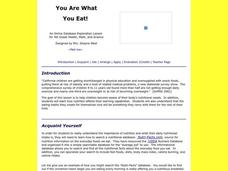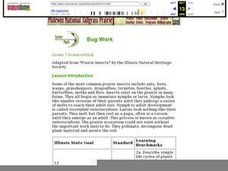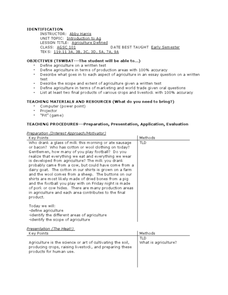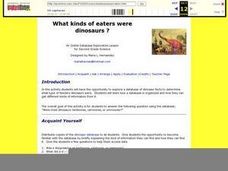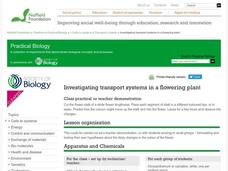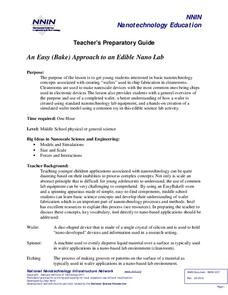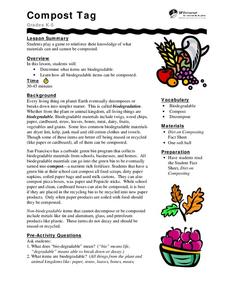Curated OER
The Living Environment
In this living environment worksheet, students complete a crossword puzzle given 34 clues about the various species in the environment that produce, consume and decompose. Topics also include photosynthesis, respiration, glucose, organic...
Alliance Theater
The Jungle Book Post-Show STEAM Lesson
An ecosystem is really just the flow of energy through many different living organisms. A study of Rudyard Kipling's The Jungle Book leads to an environmental science activity in which learners study how various factors can affect...
Curated OER
Environmental Awareness and Children's Literature
Use an alternative setting for pregnant teens and young mothers, as well as special education children to examine environmental topics through literature. Included in this unit is a visit to neighborhood libraries to select children's...
Curated OER
Color Mixing
Students experiment with primary colored water to mix new colors. They record new colors on a simple data sheet and share opinions on their work.
Baylor College
Digestion
Digestion is an amazing and complicated process that provides humans with the energy they need to survive. Lesson six in this series on the science of food uses sliced turkey and a meat tenderizer to demonstrate how enzymes help break...
Curated OER
What Are You Eating?
Discover the calorie content of foods by observing how much heat they produce in water. If you have a calculator-based laboratory (CBL™) insturment for collecting data, then this laboratory worksheet will not need any changes. If...
Curated OER
The Scientific Method
Young scholars examine the Scientific Method. They will discover the value in being observant, organized, and thorough with regard to science. They will also explore how these traits can serve them well in other areas of life.
Curated OER
Civil War Recipes
Pupils make foods that would have been staples during the Civil War era and may have been eaten by a soldiers. They follow a recipe to make hardtack and are exposed to other recipes at the included websites.
Curated OER
You Are What You Eat!
Fourth graders discover the nutritional needs of their bodies. Using a database, they research how nutrition affects their learning capabilities. They take the food they eat on a daily basis and discover its nutritional value. They...
Curated OER
Prairie Scavenger Hunt
Here is a simple lesson for young learners on the plants, animals, and flowers found in the prairie environment. There are worksheets embedded in the plan that pupils use once a teacher-led discussion and demonstration has taken place....
Curated OER
Life is Weird
Separate your science class into small groups and assign each a specific deep-sea organism to research. The class will learn about all of the organisms as each group presents their assigned animal. Following their presentations, you can...
NorthEast Ohio Geoscience Education Outreach
Ecosystems and Change
Pairs of ecologists select an animal and investigate an ecosystem from its point of view. This simple lesson involves Internet research and putting together a presentation of collected information.
US Department of Energy
Draft-O-Meter
Help your class improve the energy efficiency of their homes with the draft-o-meter. Simply tape a sheet of plastic wrap to a pencil and use it to observe any air leaking through windows, doorways, and other locations around the house....
Curated OER
Bug Work
Students explore the life cycles of insects and how they interact with each other in the prairie to create a healthy ecosystem and viable food chain. They list animals or insects in their own community that are similar to the prairie...
Curated OER
Agriculture Defined
Open your Agriculture 101 course with a lesson on defining agriculture. Guide your class with thought-provoking questions and discussion. Give them time to play the card game, "Pit" in order to experience commodity exchange. This is a...
Curated OER
Bycatch
Bycatch is the unwanted and discarded marine life caught during commercial fishing. Young marine scientists review bycatch litigation and analyze graphs of bycatch data and answer questions about it. This raises awareness while...
Curated OER
ALARA
This activity sheet posts a chart of the common radiation sources in our everyday lives. Chemistry scholars use it to analyze their own radiation exposure using rem (Roentgen equivalent for man) units. This simple assignment increases...
Curated OER
Mangrove Ecosystem
Eager ecologists explore ecosystems through video and photographs of a Mangrove. They discuss the animals in this habitat and how they interact with each other after reading and discussing "The Sea, the Storm and the Mangrove Tangle."...
Curated OER
Recyclers to the Rescue
Fifth graders examine the concept of the food chain and define producer, consumer, herbivore, carnivore, and omnivore. They draw a food chain for a mouse and discuss the different organisms involved in the chain, and conduct an...
Curated OER
What Kind of Eaters Were Dinosaurs?
Second graders use a database to gather more information on dinosaurs. Using the information, they discover how the database is organized and how to get different information from it. They complete a worksheet with comprehension...
Nuffield Foundation
Investigating Transport Systems in a Flowering Plant
Some weddings have flowers in a unique, unnatural color to match the theme. Young scientists take part in this process to learn about the function of the xylem as they observe colored water moving through a flower. Then, they experiment...
Education Outside
Honey Tasting
Young scientists will be abuzz as they sample and compare the tasty treats produced by Apis Mellifera.
National Nanotechnology Infrastructure Network
An Easy (Bake) Approach to an Edible NanoLab
You can make it if you bake it! Young scientists model electronic chip fabrication with an easy bake oven. They create a design to embed in their brownie "chips" and compare their models to wafer production in basic nanotechnology.
SF Environment
Compost Tag
Composting is a great way to get children involved in recycling. First, they discuss how biodegradable products decompose to make compost. Then, they talk about what can and cannot be composted. They play a game similar to around the...


